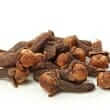Background
- Clove is widely cultivated in Indonesia, Sri-Lanka, Madagascar, Tanzania, and Brazil. It is used in limited amounts in food products as a fragrant, flavoring agent, and antiseptic.
- Clinical trials assessing monotherapy of clove are limited, although the expert panel German Commission E has approved the use of clove as a topical antiseptic and anesthetic. Other uses for clove, such as premature ejaculation, dry socket, and fever reduction, lack reliable human clinical evidence.
- Clove is sometimes added to tobacco in cigarettes, and clove cigarettes ("kreteks") typically contain 60% tobacco and 40% ground cloves.
- Eugenol, a constituent of clove, has been used for analgesic, local anesthetic, anti-inflammatory, and antibacterial effects. It is used in the form of a paste or mixture as dental cement, filler, and restorative material.
- Plant oils, including clove, may be used in livestock to inhibit microbial fermentation in waste products. Clove oil may be found in high concentration licorice (glycyrrhizin) products to prevent gel formation in an aqueous solution.
References
Natural Standard developed the above evidence-based information based on a thorough systematic review of the available scientific articles. For comprehensive information about alternative and complementary therapies on the professional level, go to . Selected references are listed below.
- Alqareer A, Alyahya A, Andersson L. The effect of clove and benzocaine versus placebo as topical anesthetics. J Dent 2006;34(10):747-50.
View Abstract - Chami N, Bennis S, Chami F, et al. Study of anticandidal activity of carvacrol and eugenol in vitro and in vivo. Oral Microbiol.Immunol 2005;20(2):106-111.
View Abstract - Darshan S. Doreswamy R. Patented antiinflammatory plant drug development from traditional medicine. Phytother.Res 2004;18(5):343-357.
View Abstract - Eisen JS, Koren G, Juurlink DN, et al. N-acetylcysteine for the treatment of clove oil-induced fulminant hepatic failure. J Toxicol Clin Toxicol 2004;42(1):89-92.
View Abstract - Elwakeel, H. A., Moneim, H. A., Farid, M., and Gohar, A. A. Clove oil cream: a new effective treatment for chronic anal fissure. Colorectal Dis. 2007;9(6):549-552.
View Abstract - Jadhav BK, Khandelwal KR, Ketkar AR, et al. Formulation and evaluation of mucoadhesive tablets containing eugenol for the treatment of periodontal diseases. Drug Dev Ind Pharm 2004;30(2):195-203.
View Abstract - Janes SE, Price CS, Thomas D. Essential oil poisoning: N-acetylcysteine for eugenol-induced hepatic failure and analysis of a national database. Eur J Pediatr 2005;164(8):520-2.
View Abstract - Kim SI, Yi JH, Tak JH, et al. Acaricidal activity of plant essential oils against Dermanyssus gallinae (Acari: Dermanyssidae). Vet.Parasitol 4-15-2004;120(4):297-304.
View Abstract - Li Y, Xu C, Zhang Q, et al. In vitro anti-Helicobacter pylori action of 30 Chinese herbal medicines used to treat ulcer diseases. J Ethnopharmacol 4-26-2005;98(3):329-333.
View Abstract - Miyazawa M, Hisama M. Antimutagenic activity of phenylpropanoids from clove (Syzygium aromaticum). J Agric Food Chem 10-22-2003;51(22):6413-6422.
View Abstract - Natural Standard Research Collaboration, Chief Editors: Ulbricht C, Basch E, Natural Standard Herb and Supplement Reference - Evidence-Based Clinical Reviews, USA: Elsevier/Mosby, 2005.
- Somova LO, Nadar A, Rammanan P, et al. Cardiovascular, antihyperlipidemic and antioxidant effects of oleanolic and ursolic acids in experimental hypertension. Phytomedicine 2003;10(2-3):115-121.
View Abstract - Taguchi Y, Ishibashi H, Takizawa T, et al. Protection of oral or intestinal candidiasis in mice by oral or intragastric administration of herbal food, clove (Syzygium aromaticum). Nippon Ishinkin Gakkai Zasshi 2005;46(1):27-33.
View Abstract - Tajuddin A, Ahmad S, Latif A, et al. Aphrodisiac activity of 50% ethanolic extracts of Myristica fragrans Houtt. (nutmeg) and Syzygium aromaticum (L) Merr. & Perry. (clove) in male mice: a comparative study. BMC.Complement Altern Med 10-20-2003;3(1):6.
View Abstract - Trongtokit Y, Rongsriyam Y, Komalamisra N, et al. Comparative repellency of 38 essential oils against mosquito bites. Phytother Res 2005;19(4):303-9.
View Abstract







